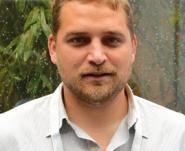
My World
 Jacob Scott uses approaches from his previous life as a physicist and engineer to build models of cancer biology and evolution from first principles, in the hope of generating novel, translatable hypotheses. On leave from his post as a radiotherapist, he is a researcher at the H Lee Moffitt Cancer Center’s department of Integrated Mathematical Oncology, and DPhil candidate at Oxford University’s Centre for Mathematical Biology.
Jacob Scott uses approaches from his previous life as a physicist and engineer to build models of cancer biology and evolution from first principles, in the hope of generating novel, translatable hypotheses. On leave from his post as a radiotherapist, he is a researcher at the H Lee Moffitt Cancer Center’s department of Integrated Mathematical Oncology, and DPhil candidate at Oxford University’s Centre for Mathematical Biology.
Why I chose to work in cancer
I was drawn to radiation oncology initially because it allowed me to use physics, a discipline I had studied all my previous life. What now keeps me in oncology is the patients, and their bravery in the face of the unknown.
What I love most about my job
As a physician scientist working in theoretical and mathematical oncology, I love being able to draw insights into complex biological processes from abstractions and mathematical reasoning, and being able to generate novel biological hypotheses from these.
The hardest thing about my job
Helping patients tread the fine line between hope and realism.
What I’ve learned about myself
I am extremely lucky, and no matter where I go, there is someone smarter, braver and harder working than I am just around the corner.
I’ll never forget…
My first cancer patient, at the Cleveland Veterans hospital, who was admitted for pneumonia, but was otherwise a picture of health. It turned out to be advanced lung cancer, and he never left the hospital. The bravery shown by him and his family taught me, at a critical point, about the responsibility we have as physicians to facilitate or keep respectful watch over families as they go through end of life issues.
A high point in my career
The amazing opportunities I have had to share with the world the new field of theoretical oncology, at gatherings such as the World Oncology Forum (www.worldoncologyforum.org) and TEDMED (www.tedmed.com).
I wish I were better at…
Mathematics. I am quite good at understanding where the big questions lie, and how mathematical techniques can be applied, but I still struggle with hard sums.
What I value most in a colleague
An open mind. The most important thing for the coming generation in cancer will be to admit that we know very little. While we have learned much, our lack of progress against cancer as a whole speaks volumes about how much more there is to learn – and in some cases unlearn.
The most significant advance in my specialty in recent years
Greater acceptance and funding for physical-science-based approaches in cancer research, such as the new Physical Sciences in Oncology Centers programme, launched by the US NCI, which is designed to bring mathematicians, computer scientists and physicists into the fray.
My advice to someone entering my specialty today would be…
Make a habit of talking with scientists and clinicians from outside your discipline. Working towards finding a common language will bear fruit in the long run. It is these conversations that will yield the next big advances.
What I wish I’d learned at medical school
I wish that I hadn’t learned most of the molecular biology that I was taught. We should be taught the general concepts, but to learn specific mechanisms is of little use to the physician in training. The time could be better spent with master teachers of anatomy and physical diagnosis, learning skills that are relevant to all physicians, and are hard to get from books later on.



Leave a Reply